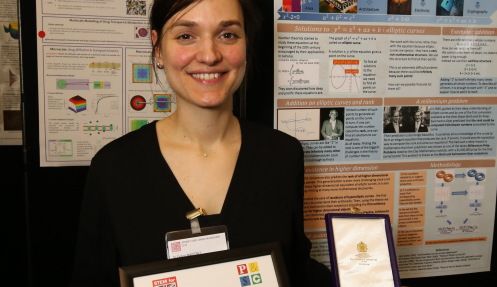Céline Miastret, a Bristol mathematician won the STEM award against hundreds of competitors.
Céline Maistret, a mathematician from the University of Bristol, took home a gold this week from the STEM for Britain awards. She was up against hundreds of entries from across the country.
Céline’s poster entry for the competition, explained her research in number theory on the parity conjecture.
Commenting on her win, Céline said: ‘It was really interesting to see the diverse range of research in my category and I’m delighted to take home the gold award for Bristol. For anyone who wants the challenge of making their research accessible I would recommend taking part.’
Shortlisted to present their work in parliament on Monday 12th March were five Bristol researchers.
'The STEM award is really a fantastic recognition for Celine's amazing work to-date.’
PhD engineering student, Joshua Mudie conducted research intoTimber-Concrete Composites. Helen Williams, a health science senior research associate submitted her work on the effects of increasing or decreasing molecule WISP-1 as a preventative tool for heart attacks.
Physics PhD student Kate Oliver looked at the use of a home-made 3D printer to make soft, shape changing objects from heat responsive chemicals and seaweed extracts. Finally Thomas Pozegic, a post doctoral engineering research associate presented his research into technologies to shape the future of transportation.
PGR posters at Parliament! Congratulations to the #BristolPGRs who were amongst those shortlisted for this year's @STEM4Brit exhibition — and to @BristolUni's Dr. Céline Maistret, who brought home a gold medal. 🏅Full story at https://t.co/IYwfEdEswU pic.twitter.com/DiHB5MKk91
— Bristol Doctoral College (@bristoldc) March 16, 2018
Head of the Mathematics School at Bristol, Professor Jens Marklof said: ‘In mathematics, probably more than in any other subject, significant breakthroughs can often be achieved by young researchers such as Celine, who bring fresh ideas to the field. The STEM award is really a fantastic recognition for Celine's amazing work to-date.’
The event is run by the Parliamentary and Scientific Committee, in collaboration with a number of royal societies and research councils.
The competition is judged by leading academics, with the gold medalist receiving a cash prize of £2,000, while silver and bronze receive £1,250 and £750 respectively.
Featured image credit: University of Bristol
What do you think of Céline's win? Let us know:
Twitter // Epigram // Facebook







